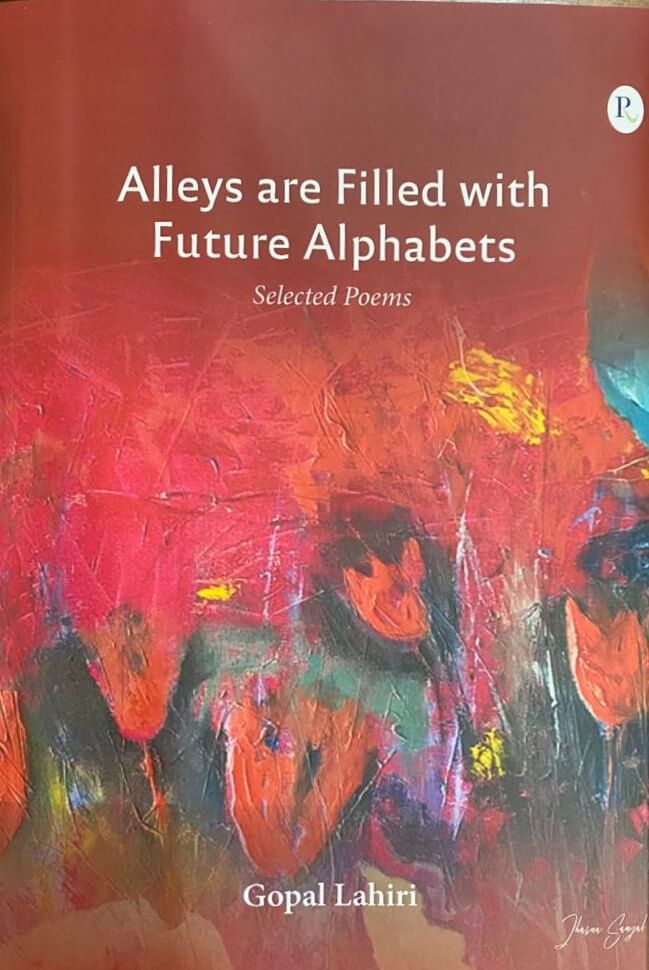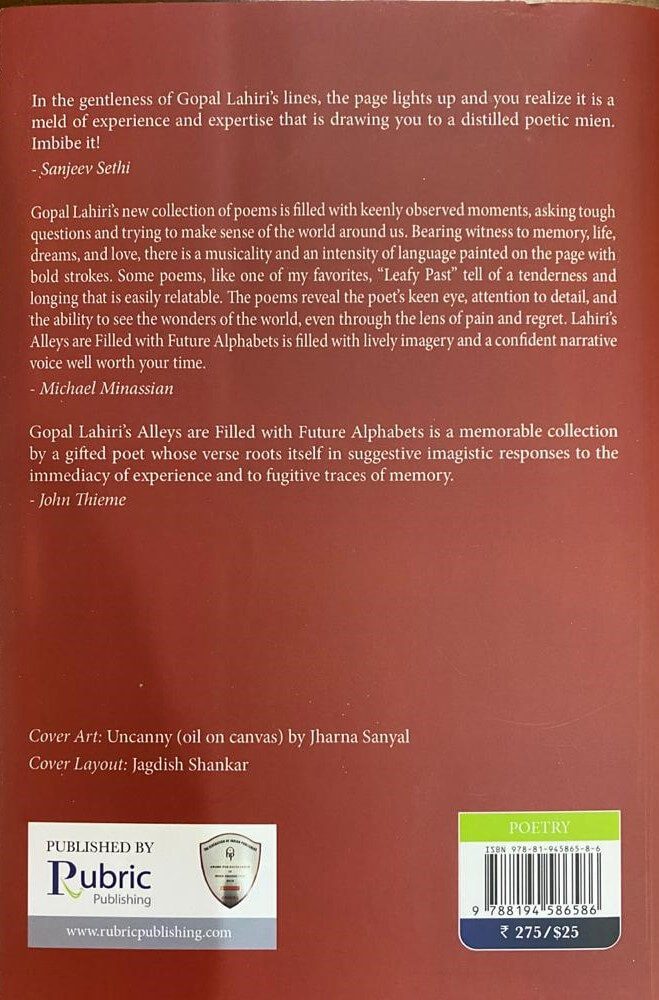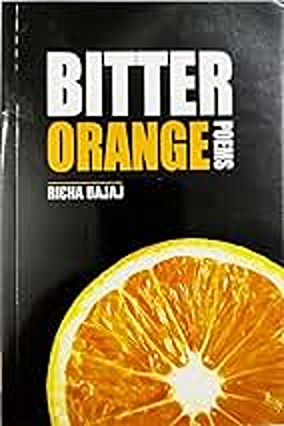Urna reviews Alleys are Filled with Future Alphabets by Gopal Lahiri. An exclusive for Different Truths.

Okay, folks, my brains were getting scrambled, and my patience was getting chopped thin and fine. Thanks to this pandemic, perhaps worse than Dante’s ‘Inferno’ and its nine circles of hell. And so, I said enough is enough, decided to take my satchel and step out for a bit.
The things I stuffed inside my brown leather satchel are my essentials. A little bit of quiet time, a tiny pouch bursting with attentiveness and a handy tube of resolve to zip myself up against the surrounding Covid gloom and doom.
But before you start panicking and trying to stop me from leaving home, let me tell you, relax…it’s not that kind of “stepping out” at all.
For this time, I decided to tie up the laces of my comfortable sneakers and walk up and down alleys of another kind. These ‘Alleys are Filled with Future Alphabets.’
That is when I knew my decision to discover the lanes and by-lanes of Gopal Lahiri’s latest poetry book had been worth the while.
And as I sauntered along the streets, laden with countless human emotions and lined with observations that ring true, I started seeing and sensing, more and more. Towering skyscrapers of grey-flecked life truths, shops displaying dappled epiphanies, street vendors and hawkers trying to grab my attention with dizzying emotional highs and gutting psychological lows. That is when I knew my decision to discover the lanes and by-lanes of Gopal Lahiri’s latest poetry book had been worth the while.
But before I invite you to walk along with me, let me tell you I could not help but fall in love with the beautiful oil on canvas cover titled ‘Uncanny’ by the acclaimed academician, poet, and painter Jharna Sanyal. And of course, the cover layout by Jagdish Shankar.
As for the evocatively penned preamble by the eminent poet Sharmila Ray, it’s an absolute must-read…
As for the evocatively penned preamble by the eminent poet Sharmila Ray, it’s an absolute must read, so say the least. Sharmila Ray helps us, the readers, to understand Gopal Lahiri’s work by diving deeper into his craft. She writes, “Reality for Lahiri is sacred in itself not a springboard to reportage or an obstacle. The physical is the spiritual in the sense it voices human heart beats, dilation, respiration which are all part of the cosmos”.
Come along then my readers and poetry lovers, let me walk you through the poems that Gopal Lahiri’s alleys are filled with. The book has been interestingly divided into seven major sections. ‘Voyages In’, ‘Voyages Out’, ‘Cityscape Silhouettes’, ‘Macrocosm’, ‘Haiku Series and Mico Poems’, ‘Travel Diaries’ and the last section, ‘Pandemic and Resilience’.
Gopal Lahiri brings fierce conviction and a pure, pristine honesty to the table.

From ‘Voyages In’, the poem that I found staggeringly powerful and honest is ‘The Other I’. It’s a compelling testament to how we are always searching for the other ‘I’ in us. Gopal Lahiri brings fierce conviction and a pure, pristine honesty to the table. And the last lines of this poem are tender and soft, crumpled as a tissue paper, light as a feather.
“You are here but far beyond real and more real!”
The other poem from ‘Voyages In’, that melted me like the sun melts the pointed end of an icicle, is called ‘Picasso’s Guitar’. Gopal Lahiri’s magical pen glides from scene to scene, dipped in melancholia to moments of epiphany.
One of my favourites from the ‘Voyages Out’ section is ‘Mother’s History’.
One of my favourites from the ‘Voyages Out’ section is ‘Mother’s History’. Here Gopal Lahiri achieves great psychological realism, and this is a poem I can return to, again and again.
Then again, there is yet another personal favourite from ‘Cityscape Silhouettes’ called ‘City Lights’. An uncategorisable celebration of vivid imagery, “discoloured apartments” and “cheap cigarettes on lips”. Part travelogue, part memoir, all-consuming for the senses.
From the section ‘Macrocosm’ I can mention many poems which took my breath away. But there is one poem that stirred something deep inside. It’s called ‘Warmth’ and the truths it tells are wrenching, permanent.
Then there is ‘Stagecraft’, which holds a mirror to our lives perched precariously…
Then there is ‘Stagecraft’, which holds a mirror to our lives perched precariously, on the edge of uncertainty. And the poem’s not to be missed line which pretty much sums up our present-day realities, “entropy has now become a leitmotif”.

‘The Haiku Series and Micro Poems’ section is almost like a cloudless night sky dotted with diamonds, a constellation of bunched up stars. For example, take #6 from Haiku Series 1. It glimmers, shimmers, and tells you so much.
Stars come out from the clouds sharing stories
The ‘Travel Diaries’ section takes travel jottings and journaling and stretches it across the cobalt-blue horizon of a keen sense of observation. Ribboned and serpentine, exploratory and untamable. ‘Coorg Concerto’ is aromatic with pepper, cardamom and its Arabica coffee plants. Not to forget its imagery of
tiny birds in flight like forgotten punctuation marks
‘Pandemic and Resilience’, is a section that I read quite a few times. The poem titled ‘Transition’ is aptly titled and underlines our collective helplessness, “The city empties out, the skyline dims”.
And then there is ‘Recovery’ that will slice away chunks from your heart with its “hurried notes of goodbyes and condolences” as the poem reflects our daily tightrope walk. Balancing the stench of fear on one side, and naked, elemental hope on the other.
Gopal Lahiri’s poems will make you walk around the lanes of memories…
Gopal Lahiri’s poems will make you walk around the lanes of memories and realisations, of sadness and of bitter-sweet sepia tinted road signs. Here the addresses are simile-drenched, metaphor-suffused, alliteration-doused.
The streets are littered with delicious insights into real lives and often take unexpected turns into gold mines of observations. And John Thieme of the University of East Anglia (UK) explains this so well in his eloquently written postface too. Thieme writes, “The poems often deal with transient phenomena – moments in the day; the flight of birds; the minutiae of landscapes and cityscapes – and sharply realised observation lies at their core, but observation is never an end in itself”.
Finally, Gopal Lahiri’s voice is singular, intriguing, and searching.
Finally, Gopal Lahiri’s voice is singular, intriguing, and searching. His words are soft and tender. Never harsh, never hanging awkwardly like a broken disjointed bone. Yet he manages to stretch and pull with his imagery, the shapes of memories, the hues of realizations and the textures of epiphanies.
And Gopal Lahiri builds them slowly and patiently. Word by word, brick by brick, not just into windswept alleys, cobbled streets, less-traveled roads, and tree-lined crossroads, but into an entire city.
A city with caramelised sugar and cinnamon reflections.
A city with caramelised sugar and cinnamon reflections. Mother-of-pearl and polished silver observations. Tulips and shiuli flowers of fragrant awareness. Yellow pinpricks of light and graffitied perceptive walls, so that we may lean against them for a while and catch our breath, as we keep walking down the alleys of this journey called life.
Visuals sourced by the reviewer





 By
By
 By
By
 By
By
 By
By
A review that opens new doors into poetry.